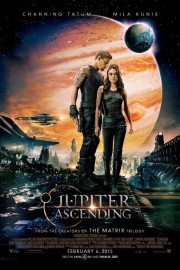Jupiter Ascending
If there’s one thing you can say, unequivocally, about Lana and Lilly Wachowski as filmmakers, it’s that they don’t really give a shit about pleasing the masses with each film, and thankfully, Warner Bros. has allowed them to follow that impulse for 15 years. Look at “The Matrix.” I don’t have a lot of love for that movie, but I’d be foolish to not see how that was something of a game-changer when it comes to big-budget action cinema; it’s still, very much, in the conventions of a Hollywood blockbuster, but it’s unlike anything we’d seen before in the genre. If you look at the sequels, though, you see the Wachowski’s taking the story even further into narrative and philosophical knots while also servicing the genre, but come on, that franchise got weird by the end. They followed that film up with the colorful, over-the-top “Speed Racer” and ambitious “Cloud Atlas,” neither of which were able to much of a dent. A lot of the goodwill they earned with “The Matrix” seemed gone, although honestly, both “Speed Racer” and “Cloud Atlas” are infinitely better than the “Matrix” franchise ever was.
With “Jupiter Ascending,” though, they truly are doing something for themselves. It follows within the boundaries of the young adult genre that Hollywood has been mining in recent years, as well as the “chosen one” narrative conventions they’ve been doing riffs on for 16 years, but the visual designs and narrative twists of this intergalactic “finding your destiny” story are all the Wachowskis. I started to be reminded of watching Luc Besson’s “The Fifth Element” about halfway through this film; that was a life-long passion for the filmmaker, and when he was allowed to indulge that passion on-screen, it was unlike anything else out there as sci-fi. “Jupiter Ascending” isn’t quite as original as that film is, but it also is, singularly, the work of the filmmakers behind it. Can you imagine this film coming from Spielberg or Lucas or J.J. Abrams? Nope. This is Andy and Lana’s baby all the way through, and that makes it an exciting proposition alone.
The story is a bit complicated to explain, but it deals with a young woman (Jupiter Jones, played by Mila Kunis) who finds that she, in fact, the queen of the universe, the embodiment of the mother of a family that runs the galaxy. It’s basically a massive power struggle for not just Earth but the universe, in general, and Jupiter is at the center of it. To try to explain it more might very well make my head explode, in very much the same way “The Matrix” sequels did to audiences in 2003. It’s a great credit to the Wachowski’s boundless imagination and passion that they corralled a cast that includes Kunis, Channing Tatum, Sean Bean and Eddie Redmayne, and ask them to do some pretty silly things along the way. This is a very silly film, but it’s also a visually stunning film, with the cinematography by John Toll accentuated by some stunning visual effects, all set to a brilliant score by Michael Giacchino, who continues to show himself to be one of the great musical talents in modern cinema. Seriously, it’s great stuff. The movie itself? Not so much– it’s compelling, no doubt, but primarily in terms of the technical qualities the Wachowskis and their collaborators bring to it. The story is too absurd, and characters too thin, to really be enjoyed on anything other than a superficial level. That said, I’m still game for what the Wachowskis do moving forward, because honestly, we need their voice in cinema, and even if it’s just because of “Speed Racer” and “Cloud Atlas,” they have my undivided attention from here on out.










